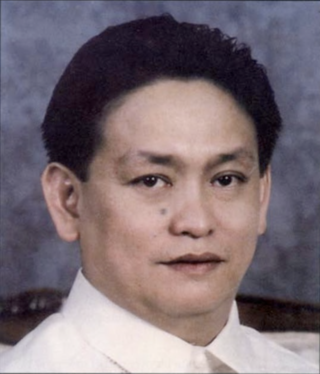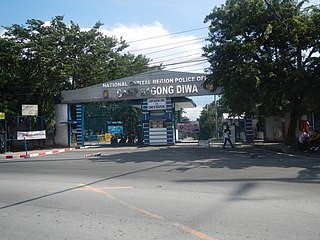| Term | Literal translation | From | Definition and use |
|---|---|---|---|
| A.C., [1] administrative case [2] | N/A | English | A case brought under administrative law in the form of a quasi-judicial proceeding by an agency of a non-judicial branch of government, or, the Office of the Court Administrator. Normally, such cases are internal disciplinary matters—court cases criminal and civil can be brought alongside them if warranted. |
| academic | N/A | English | Moot—changed circumstances have rendered the case of intellectual interest only; no ruling will have a practical effect on the law or jurisprudence. |
| Act | N/A | English | When on its own, as in "Act No. 3326", a law passed by the defunct colonial-era Philippine Legislature. |
| A.M. | N/A | English | "Administrative matters" before the Supreme Court of the Philippines. |
| arguendo | asserting | Latin | "For the sake of argument", as in, "Even arguendo that R.A. 10175 applies, this case still should be dismissed due to a lapsed prescriptive period." |
| arresto mayor | major detention | Spanish | See Revised Penal Code § Penalties. |
| arresto menor | minor detention | Spanish | See Revised Penal Code § Penalties. |
| B.P. [2] | nationwide law | Tagalog | Abbreviation for Batas Pambansa, the name for laws passed by the defunct unicameral Batasang Pambansa. |
| C.A. | N/A | English | Abbreviation for both Commonwealth Act and Court of Appeals, depending on context. |
| destierro | exile | Spanish | See Revised Penal Code § Penalties. |
| eCourt | N/A | English | An electronic database of cases at the lower levels of the judiciary. eCourt was seldom used before the COVID-19 pandemic. [3] Includes "eFiling", a way to submit pleadings and other court documents electronically. [4] |
| E.O. | N/A | English | Abbreviation for Executive Order. |
| expediente | file, dossier | Spanish | As special rules apply to the release of the rollo , the office of each member of the Supreme Court is allowed to take a copy of the rollo . This is the expediente. [5] |
| fallo [2] | verdict failure (non-legal translation) | Spanish | The dispositive portion of a Court's ruling, coming at the very end of the ruling. Cf. conclusion. This word has the same meaning in the modern Spanish judicial system. [6] |
| fiscal [2] | prosecutor | Spanish | A prosecutor, either at the city or provincial level, or nationwide Department of Justice level. Cf. procurator fiscal. |
| G.R. | N/A | English | Abbreviation for General Register. See Case citation § Philippines. |
| IBP | N/A | English | Integrated Bar of the Philippines [7] |
| information | N/A | English | An indictment. [8] In the United States, which originated the term, there are grand juries, and indictments are more common, while an information is a rare type of criminal action brought in the absence of a grand jury. [9] However, the Philippines has no grand juries (and, indeed, no juries of any kind), so "information" is essentially synonymous with "indictment". [10] |
| intervenor-oppositor | N/A | English | An intervenor who opposes the case of the petitioner. [11] Sometimes shortened to just "oppositor". [12] Cf. petitioner-in-intervention. |
| JBC | N/A | English | Judicial and Bar Council |
| judge-at-large | N/A | English | A judge without a permanent sala . Under R.A. 11459, such judges have all the rights of regular RTC judges, and the same salaries. They are also chosen by the President upon the advice of the JBC as other RTC judges are. [13] |
| MCTC [14] | N/A | English | Municipal Circuit Trial Courts, a Municipal Trial Court that covers more than one municipality [15] |
| MeTC [14] | N/A | English | Metropolitan Trial Courts, a type of civil court below Regional Trial Courts |
| MTC [14] | N/A | English | Municipal Trial Courts, a type of civil court below Regional Trial Courts |
| MTCC [14] | N/A | English | Municipal Trial Courts in Cities, a type of civil court below Regional Trial Courts |
| OCA | N/A | English | Office of the Court Administrator |
| petitioner [2] | N/A | English | A plaintiff. |
| petitioner-in-intervention | N/A | English | An intervenor who supports the case of the petitioner. [11] Cf. intervenor-oppositor. |
| ponencia [2] | report | Spanish | The Court's majority opinion. |
| ponente [2] | speaker [at a meeting] | Spanish | The writer of the Court's majority opinion. Mostly used in the context of the Supreme Court, but can be used at the Regional Trial Court level. |
| prefatory statement [2] | N/A | English | A statement which summarizes a legal document, similar to an abstract. |
| prisión correccional | corrective imprisonment | Spanish | See Revised Penal Code § Penalties. |
| prisión mayor | major imprisonment | Spanish | See Revised Penal Code § Penalties. |
| quasi-judicial agency | N/A | English | An agency of the executive branch that exercises some judicial functions and before which a minimum of due process is required. [16] Cf. administrative case. |
| quo warranto | by what authority | Latin | See Quo warranto § Philippines. |
| R.A. | N/A | English | Abbreviation for Republic Act. |
| raffle | Original meaning: a type of lottery | English | The system by which cases are assigned to judges in multi- sala courts. As of 1974, "[n]o case may be assigned to any branch without being raffled." [17] As of 2013, raffles can be conducted electronically via "eCourt". [18] The gambling-related word "raffle" comes from the sources of randomness required by the Supreme Court: preferably a roulette wheel is to be used, but if that's not available, a bingo or jueteng tambiolo is permissible. [19] |
| reclusión perpetua | perpetual seclusion | Spanish | See Revised Penal Code § Penalties. |
| reclusión temporal | temporary seclusion | Spanish | See Revised Penal Code § Penalties. |
| respondent [2] | N/A | English | A defendant. |
| rollo | Original meaning: a set of documents rolled up for easier archival and transit, or a scroll | Spanish | Short for rollo de casación (cassation archive) or rollo de apelación (appeal archive), [20] the rollo is the complete archive of a particular case, including documents received from a lower court and anything submitted regarding the case, directly to any Philippine court, though most often used in relation to the higher courts. [5] The term has its origin in the Real Audiencia de Manila , and is still used in the modern Supreme Court of Spain (Tribunal Supremo) and Spanish judicial system. [21] Cf. expediente . |
| RTC [14] | N/A | English | Abbreviation for Regional Trial Court. |
| sala [2] | courtroom | Spanish | Courtroom, though used only to refer to a specific branch of a Regional Trial Court, and not to refer to higher courts, unlike in Spain, where sala remains in use for all courts (e.g. in the set phrase la sala acuerda [22] —lit. the chamber agrees, or to describe a division of the Spanish Supreme Court, e.g. la tercera Sala—"Branch №3".) An acting judge serving in a temporary or acting capacity is said to be without a sala. [1] Some RTC branches have only a single sala. [17] Also cf. judges-at-large. |
| SC | N/A | English | Supreme Court of the Philippines |
| SCC [14] | See sharīʿah § Etymology | Arabic | Sharia Circuit Court |
| SDC [14] | See sharīʿah § Etymology | Arabic | Sharia District Court |
| TRO | N/A | English | A temporary restraining order. [23] |
| TSN | N/A | English | Transcript of stenographic notes. [24] A court stenographer first takes down their notes in their preferred form of shorthand, e.g. Gregg shorthand, then produces a longhand transcript from it called a TSN. [25] |
| UDK | N/A | English | An undocketed case, undocketed because, for example, the docket fee has not yet been paid. [5] Undocketed cases are still numbered, and may be ruled on at the discretion of the court, for example, Fletcher v. Bureau of Corrections has no G.R. number, but is instead cited as UDK-14071. [26] |













